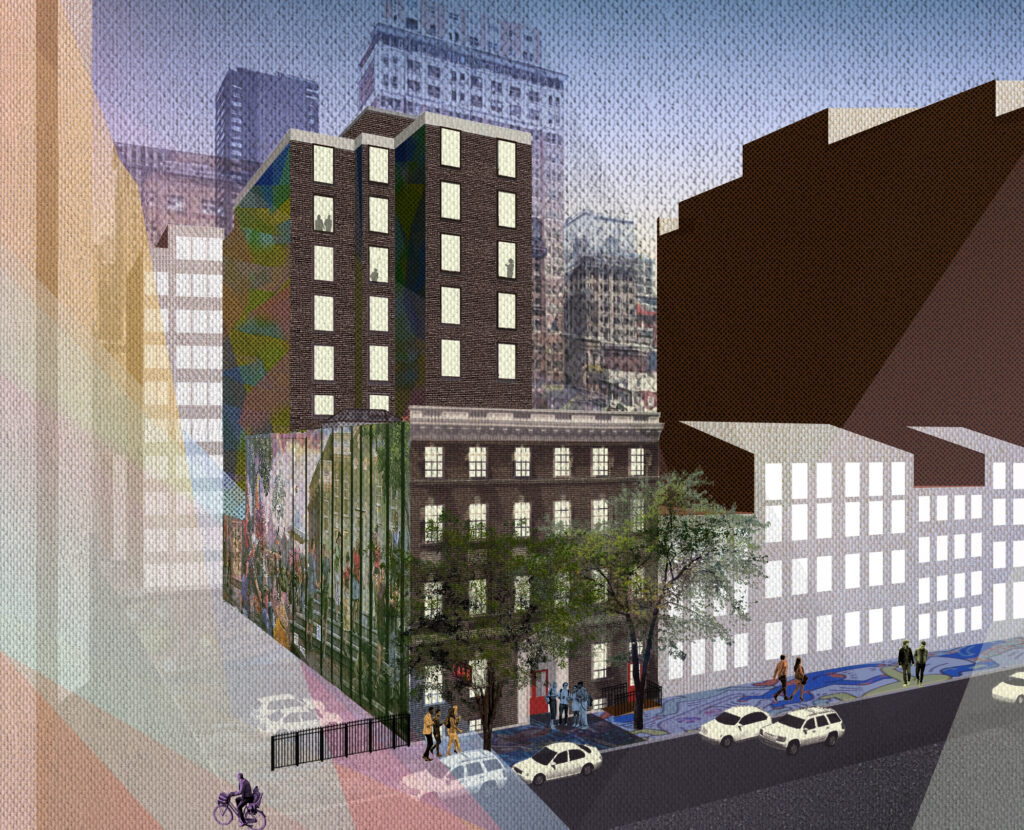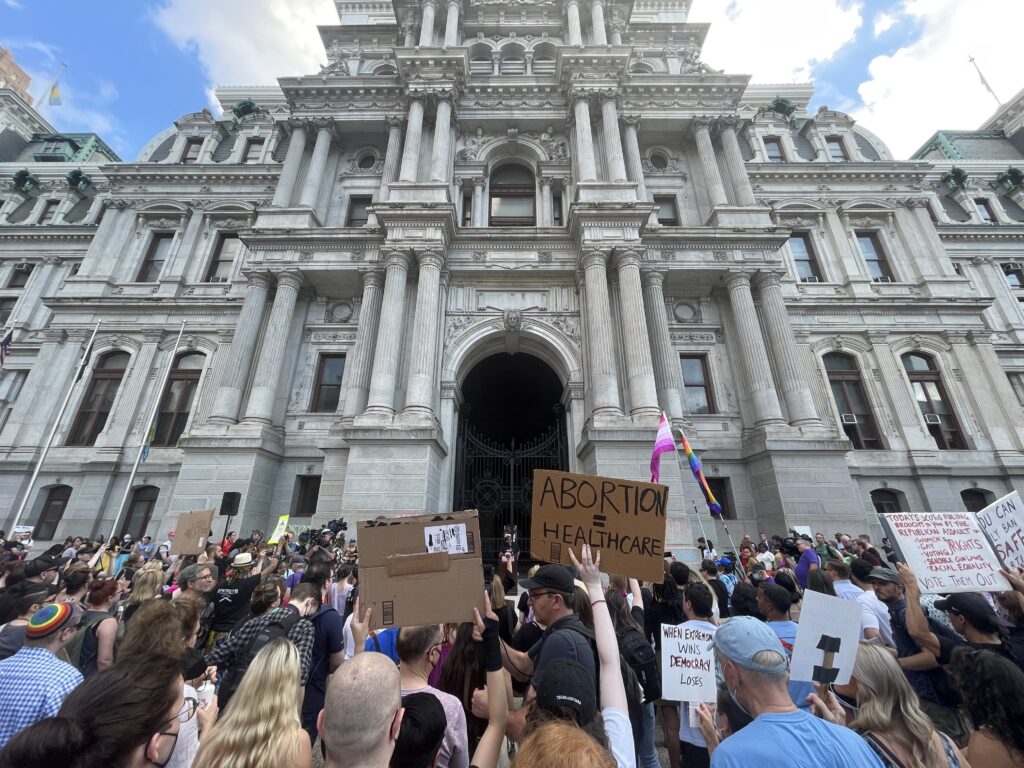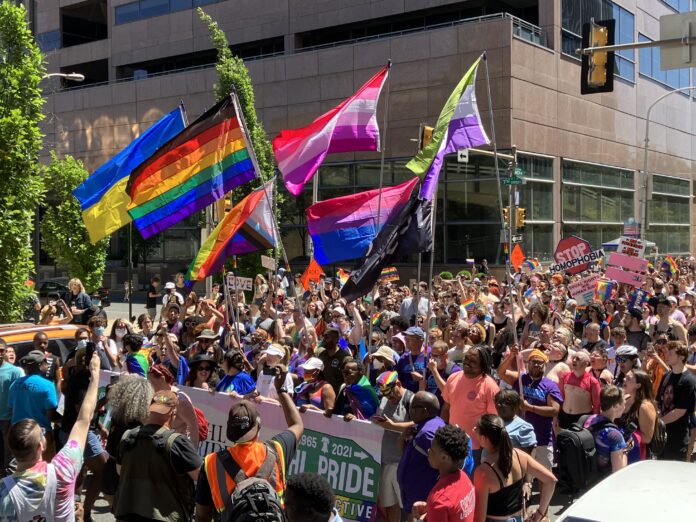Unsurprisingly, 2022 saw a mixture of victories and setbacks for the LGBTQ community locally, statewide, and nationally. Politically, a record number of openly LGBTQ politicians won their races while at the same time a record number of book bans and anti-LGBTQ legislation swept through school boards and state legislatures. In the public health sector, the community continued to mitigate the effects of Covid-19 while also dealing with a new public health threat in monkeypox. And, after a three year absence, a Pride celebration once again returned in person to the city of Philadelphia.
PGN took a look back at some of the most memorable and important stories of 2022.
Philly Pride returns in-person after three years
Unlike the last in-person Pride in 2019, which featured a parade including floats, costumes and music, this year’s Philadelphia Pride began with a political march from 5th and Arch Street to the Gayborhood. Participants held signs that read “Protect Trans Kids” and flew flags of all sections of the LGBTQ community. “This is the first Pride that I’ve felt a part of,” Jose de Marco said to the march crowd. “The former organizers of Pride would not move the date of Pride so we as Black folks could attend Odunde.” Following the march, a festival was held in the Gayborhood that included vendors, music, a family and kids section, and a food cart area. “It just felt so, so good to be back in community in such a big way again,” said Adrienne Standley, organizer with ACT UP Philadelphia. “It’s incredible what the organizing committee was able to put together in limited time, and the intentionality that went into it. I’m just really grateful. And I’m so glad to be queer.”

William Way Community Center to upgrade and expand
The William Way LGBT Community Center announced plans to redesign and upgrade its building at 1315 Spruce Street, which it has occupied since 1997. The revamped WWCC will include a rental space, a new catering kitchen, a new event space, and a ten story tower for office and meeting space. It will also have a modernized look and more accessibility. The expansion was made possible by two grants totaling $3.5 million, $2.5 million from Pennsylvania’s Redevelopment Assistance Capital Program (RACP) to be allocated toward enhancement and expansion, and $1 million from the William Penn Foundation. Community leaders gathered at an November 29 event that featured WWCC executive director Chris Bartlett, Governor Tom Wolf, U.S. Rep. Dwight Evans, Pa. Senators Sharif Street and Nikil Saval, William Way board officer Kira Kinsman, Celena Morrison, executive director of the Office of LGBT Affairs, and Kathy Christiano, board member at the William Penn Foundation. Construction on the upgrades is expected to begin in September 2023.
Historic LGBTQ wins in 2022 election
The midterm elections, which are often seen as a referendum on the sitting U.S. President, proved fruitful for LGBTQ candidates in Pennsylvania and across the country. Among the victors were the first two lesbian governors in the nation, Maura Healey in Massachusetts and Tina Kotek in Oregon. In addition, openly gay governor Jared Polis won reelection in Colorado, bringing the number of LGBTQ governors to three. LGBTQ candidates also won races for U.S. House, state legislature, state attorney general, and state treasurer. Overall, 436 LGBTQ candidates won election, 100 more than in 2020. In Pennsylvania, four LGBTQ candidates won election to the state house: LaTasha D. Mayes and Izzy Smith Wade-El won their first elections, and Malcolm Kenyatta and Jessica Benham won reelection.
The mpox crisis reaches Philadelphia
As the Covid-19 pandemic continued to impact public health, the first case of mpox in Philadelphia was confirmed in early June. Cases in the area grew steadily and peaked in late July with 74 new cases recorded that week. Infections primarily occurred in gay men, though public health officials and local advocates were quick to report that mpox can affect anybody regardless of sexual orientation.
In late June, the CDC began distributing the Jynneos vaccine, which is used to treat smallpox but can also be used for mpox, to affected areas. Specific criteria was used to determine who could get the vaccine, including men who have sex with men and had multiple recent partners, as well as those who were in close contact with someone with a confirmed case. Local health organizations including Mazzoni Center and Philadelphia FIGHT began distributing vaccines in July, though the demand far outweighed the supply at the time, and there were concerns that vaccines were not reaching those most at risk.
By October, confirmed mpox cases had dropped significantly. Philadelphia recorded 546 total cases as of November 30. Also in November, the World Health Organization announced it was renaming the virus previously known as monkeypox to mpox in an effort to reduce stigma.
Roe v. Wade gets overturned, leading to fears over marriage equality

On June 24, the U.S. Supreme Court overturned Roe v. Wade and Planned Parenthood v. Casey, nullifying the constitutional right to abortion and leaving it up to the states to determine its legality. The decision came as a result of the case Dobbs v. Jackson Women’s Health Organization, in which members of the organization challenged a Mississippi law that bans all abortions, with some acceptions, after 15 weeks of pregnancy. Abortion remains legal in Pennsylvania, though it is banned in 12 states with several more heavily restricting it.
The Supreme Court ruling, which was leaked to Politico in May (causing its own scandal within the court), prompted rallies and protests across the country. Particular to the LGBTQ community, in his concurring opinion Justice Clarence Thomas suggested that the Court look at other cases decided on a similar basis as Roe, including Obergefell vs. Hodges, which legalized same-sex marriage, and Lawrence v. Texas, which removed sodomy laws.
Over growing fears that marriage equality would be overturned by the Supreme Court, the U.S. Congress passed the Respect For Marriage Act, which does not legalize marriage equality nationwide but allows for all existing marriages to be recognized. The RFMA also rescinded the Defense of Marriage Act (DOMA). President Biden signed the RFMA into law on December 13.
Threats to hospitals and drag shows
As a result of a growing anti-LGBTQ “parents rights” movement, conservative social media influencers, and Republican politicians who continue to spread misinformation about gender-affirming care for youth, many hospitals around the country, including Children’s Hospital of Philadelphia (CHOP), received threats targeting their Gender & Sexuality Development clinics. Because of those threats, CHOP increased security and other measures to ensure the safety of staff and patients.
The backlash against the LGBTQ community also extended to drag performers, specifically concerning events related to Drag Queen Story Hour. Protests against DQSH occurred nationwide, including locally, prompting some events to be canceled. This past summer in Cherry Hill, performer Brittany Lynn showed up at a library to present a Drag Queen Story Hour but was confronted by a mob of protestors. Library and DQST supporters were able to form a counter-protest, allowing Lynn to proceed with the program.
Republican efforts to ban LGBT books reaches fever pitch
A national study by PEN America, which pulled data from July 2021 to June 2022, found 2,532 book bans and restrictions — 40 percent including people of color as protagonists or prominent secondary characters; 21 percent directly addressing race and racism; and 41 percent explicitly addressing LGBTQ themes or having LGBTQ protagonists or prominent secondary characters. Texas had the most bans (801), followed by Florida and Pennsylvania, but bans had occurred in a total of 32 states and 138 school districts.
In Pennsylvania, State Senator Ryan Aument sponsored SB 1277, which would have required parents to be notified and have the option of opting out of their child having access to books in libraries and classroom materials that contain same-gender relationships and references to homosexuality. Another anti-LGBTQ bill, SB 1278, sponsored by State Senator Scott Martin, sought to ban classroom instruction on gender identity and sexual orientation for pre-kindergarten through fifth grade, among other stipulations.
Reflecting on the loss of LGBTQ community members
2022 saw the deaths of several LGBTQ leaders. Michael Hinson, a leading Black LGBTQ, AIDS and homelessness activist in Philadelphia, passed away in August at age 55. Hinson served as the CEO of SELF, Inc., the city’s largest provider of emergency and transitional housing; and he served as a liaison and policy advisor to Mayor John F. Street, during which he helped build a coalition to ensure that gender identity became protected under the city’s Fair Practices Ordinance.
Susan Silverman, an early lesbian rights activist who helped organize Gay Liberation Front in 1969, also passed away this year at age 73. To help raise money for the newly formed Gay Liberation Front, which arose out of the Stonewall rebellion, Silverman put forward the idea of community center Alternate U hosting LGBT dances, which had been limited at that time to mafia-controlled clubs like Stonewall. She was also a member of Radicalesbians, which rallied against homophobia at organizations including the National Organization for Women. In her later years, Silverman lived at the John C. Anderson Apartments (JCAA) and found community there.
Another longtime advocate and mentor in the LGBTQ community, Maddy Gold, passed away in November after a battle with cancer. An art teacher at University of the Arts, Philadelphia University, and Drexel University, Gold infused her art with the activism that also played an important part of her life since coming out as a lesbian while attending the Philadelphia High School for Girls. She was known for her dedication to her students, her advocacy, and her activism.
